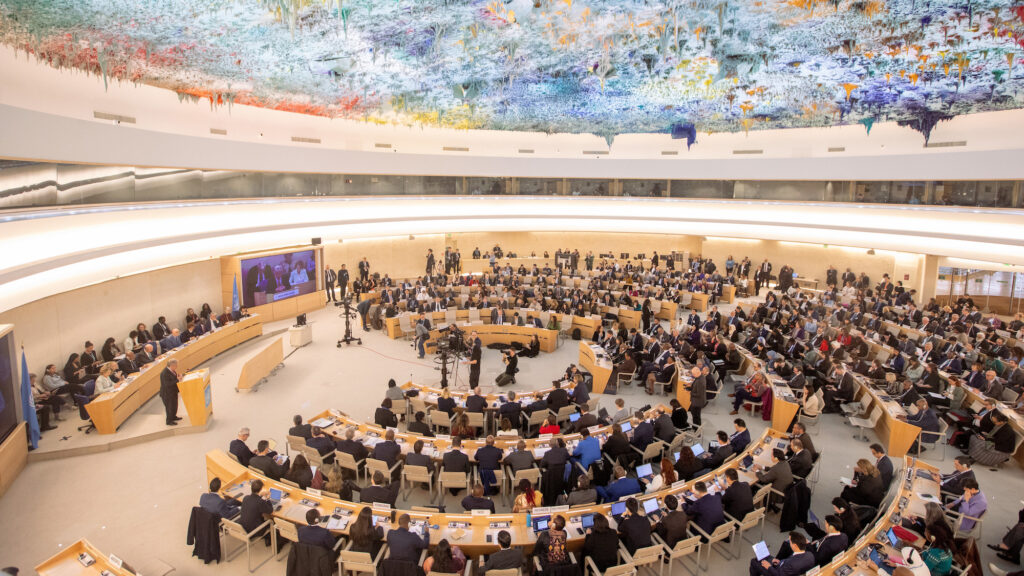You can find all our statements delivered during this session below as they become available. Our past advocacy interventions are available here.
Item 10: General Debate – the Philippines (3 April)
As the UN Joint Programme on Human Rights (UNJP) is nearing its conclusion later this year, we called attention to the ongoing extrajudicial killings in the Philippines. Considering the prevailing impunity in the country, we urged the Council to mandate the High Commissioner for Human Rights to conduct a comprehensive evaluation of the UNJP. In the absence of such a resolution, we asked all Member States to join our call on the Office of the High Commissioner to undertake this assessment on its own initiative.
Item 4: General Debate – United Kingdom (21 March)
In the first statement delivered under our new Europe program, we expressed our concerns over the United Kingdom’s failure to fulfill its international legal obligations while highlighting issues with the Safety of Rwanda Bill and the Illegal Migration Act. Similarly, the 2024 Northern Ireland Troubles Act was found to be incompatible with five aspects of the European Convention on Human Rights and the Windsor Agreement. While we welcomed the government abandoning plans to abolish the Human Rights Act, we reiterated that all States must fully implement their international human rights obligations.
Item 3: General Debate – Business and human rights (15 March)
In a joint statement, we reemphasized the urgent need for a binding UN instrument aimed at preventing and providing accountability for human rights violations by corporations. Although we are encouraged by some of the progress made during the ongoing negotiations toward such a treaty, we remain concerned that the new draft text weakens the obligation of businesses to respect human rights. Meanwhile, we continue to see signs of the corporate capture of UN Processes. During the Council, we called on all governments, especially those in the Global North where most transnational corporations are headquartered, to support a strong, legally binding treaty that can set a floor for regulating corporations in a way that is in line with human rights and gender justice.
Item 3: Interactive Dialogue with the Special Rapporteur on freedom of peaceful assembly and association – Indonesia (7 March)
Franciscans International called attention to the continued use of excessive force, arbitrary arrests, harassment, intimidation, and threats against Indigenous Papuan activists in the context of peaceful protests. More generally, civic space in West Papua continues to shrink. For example, recently the military has put up public billboards displaying the names of Indigenous Papuans on a wanted list in an attempt to muzzle peaceful gatherings. We urged the Indonesian government to uphold international standards on the use of force during peaceful protests and called for an impartial investigation into several incidents raised in our joint statement.
Item 3: Interactive Dialogue with the Special Rapporteur on human rights and the environment (6 March)
Franciscans International expressed its gratitude to the outgoing Special Rapporteur for his efforts and willingness to engage with civil society during his tenure. Highlighting the negative impacts of business activities on the environment and the role of environmental degradation in fuelling violent conflict, we expressed our hope that these issues will be taken up again by the next mandate holder.
Item 2: General Debate – Sri Lanka (4 March)
On 21 April, it will be five years since 273 people were killed during the Easter Sunday bombings. Yet much about that day remains unclear. Repeated requests for a transparent, independent, and fair investigation into the attacks have been denied by the government, while new evidence was brushed aside. With authorities introducing new laws further curtailing media freedom, we raised our concerns about the failure of meaningful accountability processes in Sri Lanka and called on the Council to insist on a transparent investigation into these matters.
Item 2: General Debate – Guatemala (1 March)
Despite a new administration taking power in January, the co-optation of the Guatemalan judicial system is still a major concern. Critical voices continue to be targeted and criminalized, with civil society organizations documenting 5.965 aggressions against human rights defenders between January and November 2023. In a joint statement, we urged the new government to establish a plan of action to accept visits from Special Procedures, implement recommendations by the Universal Periodic Review and Treaty Bodies, and request a country visit by the UN High Commissioner for Human Rights.
Thumbnail credit: UN Photo / Elma Okic

